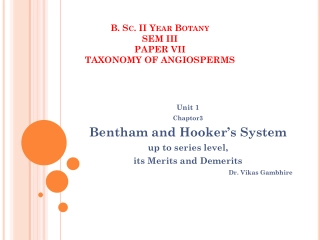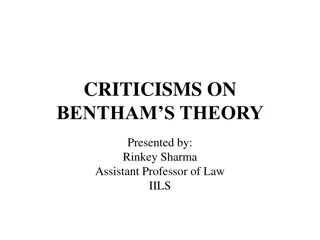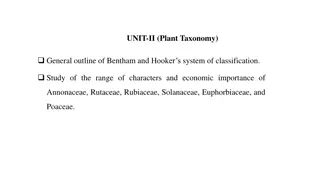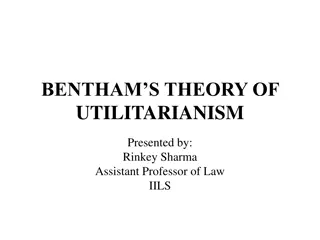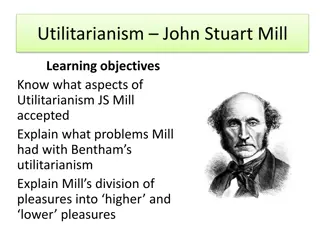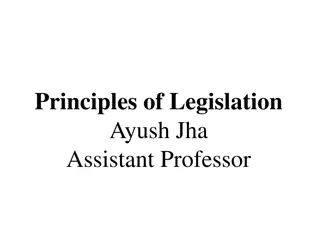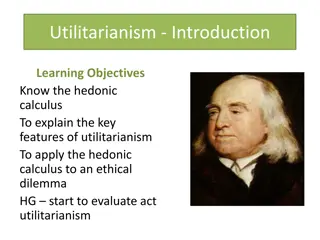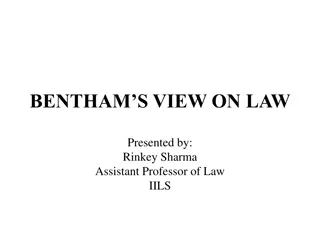Bentham and Hooker's System of Classification in Botany
Bentham and Hooker's system of classification in botany is a natural system based on a large number of characters considered simultaneously. Proposed by British taxonomists George Bentham and Joseph Dalton Hooker, this system categorizes seed plants into classes, orders, families, and genera. It is
2 views • 10 slides
Criticisms on Bentham's Utilitarianism Theory
Criticisms of Jeremy Bentham's utilitarianism theory include justifying any crime for the greater pleasure, impracticability due to individual knowledge constraints, neglecting moral consciousness, oversimplifying human nature, and focusing solely on material comforts over spiritual happiness. The t
0 views • 6 slides
Overview of Bentham and Hooker's Classification System in Plant Taxonomy
Bentham and Hooker's system of classification in plant taxonomy, outlined in Genera Plantarum, provided detailed descriptions of families and genera based on original plant dissections. This classification system has practical value for plant identification, with keys for taxa and subdivisions for l
2 views • 47 slides
Jeremy Bentham's Impact on Political Thought and Utilitarianism
Jeremy Bentham, a notable figure in Anglo-American philosophy of law, was a key proponent of utilitarianism. He emphasized maximizing happiness for the greatest number of people, critiqued laws, and advocated for legal reforms. Bentham's works reflect the societal changes during his time, addressing
0 views • 13 slides
Understanding Bentham's Utilitarianism Theory
Jeremy Bentham, often considered the father of Analytical School of Jurisprudence, introduced Utilitarianism as a guiding principle for law. According to Bentham, the purpose of law is to maximize the overall happiness and minimize pain for the greatest number of people. He developed the concept of
1 views • 7 slides
Overview of Analytical Positivism in Legal Theory
The Analytical Positivism school, also known as the Austinian school, emphasizes a sharp separation between law and morality. It views law as a command and emphasizes the importance of law as it is, rather than how it ought to be. This approach, championed by thinkers like John Austin and Jeremy Ben
0 views • 19 slides
Jeremy Bentham and Utilitarianism: A Vision for Social Reform
Jeremy Bentham, a prominent philosopher of the 18th and 19th centuries, advocated for utilitarianism, which states that the greatest happiness of the greatest number should be the measure of right and wrong. He proposed the concept of the Panopticon as a new mode of obtaining power over individuals.
2 views • 13 slides
Understanding John Stuart Mill's Utilitarianism: Aspects, Criticisms, and Pleasure Categories
Explore the key aspects of Utilitarianism as proposed by John Stuart Mill, including his acceptance of certain principles, criticisms of Bentham's Utilitarianism, and division of pleasures into higher and lower categories. Delve into the complexities of hedonic calculus, weaknesses of act Utilitaria
0 views • 16 slides
Principles of Legislation by Assistant Professor Ayush Jha
Exploring the concept of legislation, this resource delves into Jeremy Bentham's Principle of Utility, highlighting the importance of maximizing happiness and minimizing pain in law-making. It emphasizes the role of legislators in promoting virtues and distinguishing between true and false virtues t
0 views • 22 slides
Understanding Utilitarianism: A Comparative Analysis
Utilitarianism, as introduced by Jeremy Bentham, focuses on maximizing pleasure and minimizing pain to determine the ethical value of actions. Bentham's development of the hedonic calculus and the principle of utility are key components of this consequentialist theory. Influenced by hedonism and dri
0 views • 17 slides
Bentham's View on Law: Essential Elements and Eight Aspects Explained
Bentham's perspective on law, as presented by Assistant Professor Rinkey Sharma, delves into the definition and essential elements of law according to Bentham. This includes discussing the source of law, its subjects, objects, extent, aspects, force, remedial state appendages, and expression. The es
0 views • 9 slides
Understanding Utilitarianism and the Principle of Utility
Utilitarianism, as explained by Michael Lacewing, emphasizes that actions are morally right or wrong based on their consequences in maximizing overall happiness. The principle of utility, advocated by Bentham and Mill, guides moral judgments by promoting the greatest happiness for the greatest numbe
0 views • 9 slides
Jeremy Bentham and Utilitarianism
Jeremy Bentham, a late 18th-century British philosopher, introduced Utilitarianism, a moral philosophy focused on maximizing happiness and minimizing pain. He believed that all actions are motivated by pleasure and pain, and that the principle of utility judges actions based on their impact on happi
0 views • 17 slides
Understanding Utilitarianism: Consequentialist Ethics in Public Life
Utilitarianism, a consequentialist theory, evaluates the moral worth of actions based on their outcomes. This approach, exemplified by classical utilitarianism of Bentham and Mill, prioritizes maximizing overall happiness or utility. The philosophy emphasizes the principles of consequences, utility,
0 views • 14 slides
Understanding Hedonism: The Pursuit of Pleasure in Ancient and Modern Philosophies
Explore the concept of hedonism, where pleasure is considered the ultimate good in life. From ancient Greek philosophers like Epicurus and Aristippus to modern thinkers like Bentham and Mill, delve into the ethical implications and criticisms surrounding this philosophy. Understand how hedonism shap
0 views • 13 slides
Understanding Deterrence Theory and Classical Criminology
The content provides an overview of deterrence theory, focusing on key figures, assumptions, general and specific deterrence, research, and policy implications. It also delves into classical criminology, discussing key figures like Jeremy Bentham and Cesare Beccaria, concepts such as felicity calcul
0 views • 21 slides
Understanding Utilitarianism: Bentham's Moral Philosophy
Utilitarianism, a teleological and relativist ethical theory created by Jeremy Bentham, focuses on maximizing happiness and minimizing pain for the greatest number of individuals. Bentham's Act Utilitarianism emphasizes the principle of utility and uses the hedonic calculus to measure pleasure. This
0 views • 20 slides
Understanding Utilitarianism: Ethics in Public Life Administration
Consequentialist theories in ethics, particularly utilitarianism, emphasize the moral value of actions based on their consequences. Classical utilitarianism by Bentham and Mill focuses on maximizing happiness and pleasure for the greatest number of people. The core principles of utilitarianism inclu
0 views • 14 slides
